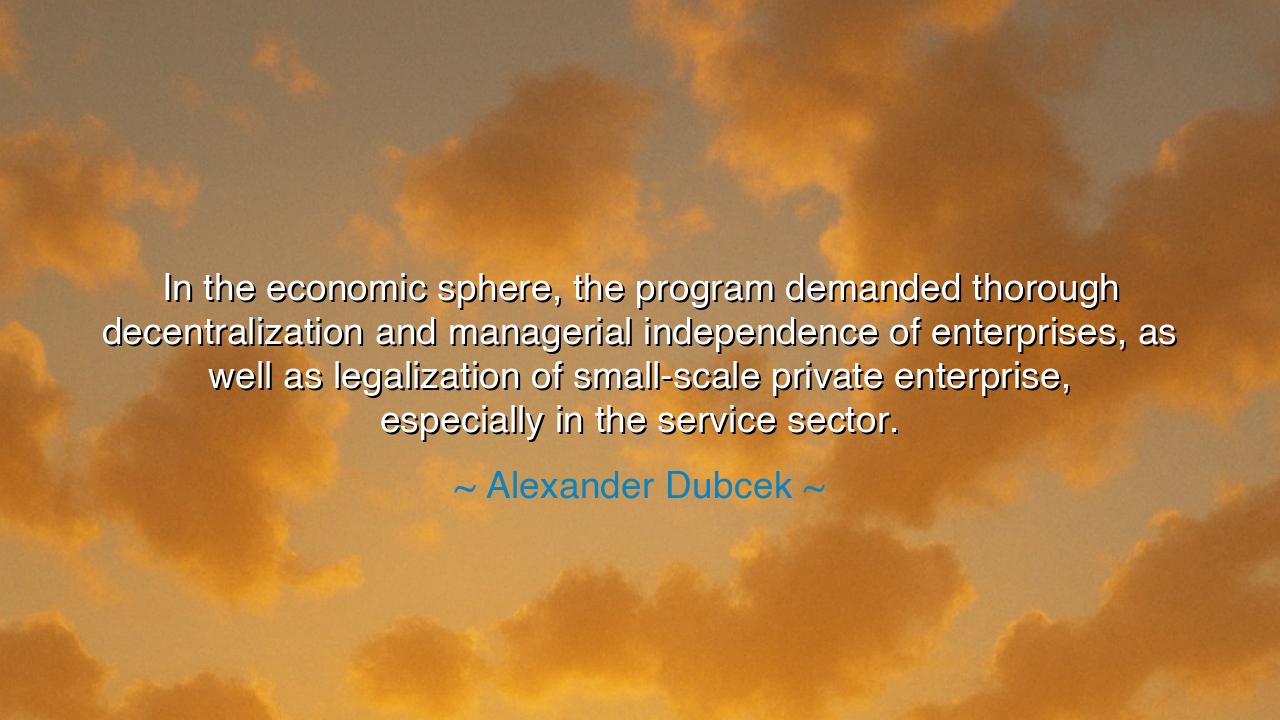
In the economic sphere, the program demanded thorough
In the economic sphere, the program demanded thorough decentralization and managerial independence of enterprises, as well as legalization of small-scale private enterprise, especially in the service sector.






The Spirit of Renewal and the Freedom to Create
Hear the words of Alexander Dubček, the reformer who dared to dream of a gentler world amid the iron age of control:
“In the economic sphere, the program demanded thorough decentralization and managerial independence of enterprises, as well as legalization of small-scale private enterprise, especially in the service sector.”
Though these words may seem drawn from policy and governance, beneath them lies a cry as ancient as the human soul—the yearning for freedom in all its forms. Dubček, speaking from within the cold machinery of a communist state, sought to return to his people not only the freedom of speech or thought, but also the freedom to create, build, and manage. His call for decentralization was more than an economic reform—it was a vision for the rebirth of dignity, the restoration of man’s right to guide his own labor and to see the fruit of his own hands.
The Meaning of Decentralization
When Dubček spoke of thorough decentralization, he sought to strike at the heart of the system that had made the state an all-consuming master and the individual a mere cog in its machine. In such a system, creativity was stifled, initiative punished, and progress made hollow by the absence of personal purpose. Decentralization, then, was not merely a shift in management—it was a return of power to the people, a call for responsibility to replace obedience, and for participation to replace command.
To grant managerial independence to enterprises was to awaken the spirit of invention that lies dormant in every craftsman, farmer, and builder. Dubček believed that when men and women were trusted with their own decisions—when they could risk, innovate, and reap reward—they would become not servants of ideology, but stewards of prosperity.
The Prague Spring: The Birth of Hope
The soil from which these words grew was the Prague Spring of 1968—a season of courage when the people of Czechoslovakia sought to marry socialism with liberty, to make the state serve the human spirit rather than dominate it. Dubček called this vision “socialism with a human face,” and his reforms aimed to soften the hardness of a system that had forgotten compassion. He saw that even within collective ideals, there must be room for individual initiative; even within structure, there must be space for freedom.
For a brief and shining moment, the world watched as the frozen heart of Europe began to thaw. Students debated, writers spoke freely, small enterprises began to bloom again, and the pulse of creativity returned to the land. But freedom, as history so often teaches, is fragile. By the autumn of that same year, tanks rolled into Prague, and the experiment of hope was crushed beneath the weight of empire.
The Ancient Echo of Balance
Yet the wisdom of Dubček’s words lives on, for they echo an eternal principle—the need for balance between unity and freedom, between the guidance of the whole and the independence of the part. The ancients knew this truth well. In the city-states of ancient Greece, too much power in one hand led to tyranny, and too much liberty without order led to chaos. The wise lawgivers sought always the golden mean, where the polis could prosper through both shared purpose and individual strength.
Dubček’s vision was the modern echo of that balance: an economy where the state empowers rather than restrains, where small-scale enterprise thrives alongside collective progress, and where responsibility flows not downward from rulers, but outward through citizens. Such is the foundation not only of good governance, but of human flourishing itself.
The Lesson of Courage and Renewal
Dubček’s life and words remind us that reform is never born of destruction, but of renewal—the courage to breathe life back into what has grown rigid. He did not seek to destroy his nation’s ideals, but to awaken their original purpose: justice, equality, and dignity. In demanding decentralization, he was calling not for rebellion, but for trust—trust in the ability of ordinary people to govern themselves, to work with conscience, and to serve the whole through the strength of the individual.
His dream was struck down, but its truth endured, whispering across generations: that freedom is not granted from above—it grows from within, wherever people are given the chance to act in good faith and take ownership of their own destiny.
The Modern Reflection
Even today, Dubček’s call resounds in every system where the individual is forgotten, in every institution where authority smothers creativity. His teaching reminds us that centralized control, whether in politics, economics, or daily life, must always yield to human autonomy. A family, a business, or a nation thrives not through obedience, but through shared responsibility.
Let every leader, every teacher, every citizen remember: to empower others is the greatest act of governance; to encourage small enterprises, free thought, and bold innovation is to nurture the true wealth of a nation. When people are trusted with independence, they repay that trust with growth.
The Eternal Teaching of Independence
Thus, Alexander Dubček’s words are not relics of history, but living wisdom. His dream—of managerial independence, of private initiative, of decentralized freedom—remains a beacon for every generation that seeks to balance compassion with liberty, and unity with individuality.
So let us act in his spirit: build systems that trust people, not control them; create opportunities where initiative may bloom; and never forget that freedom, whether of thought or of labor, is the seed from which all progress grows. For when power returns to the hands of the many, when every man and woman becomes a participant in their own destiny, then the springtime of humanity begins anew—and the dream of Dubček lives forever.






AAdministratorAdministrator
Welcome, honored guests. Please leave a comment, we will respond soon